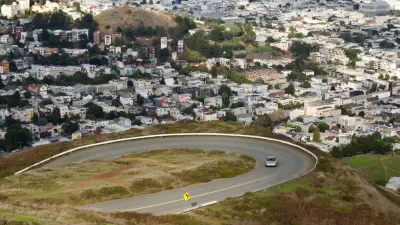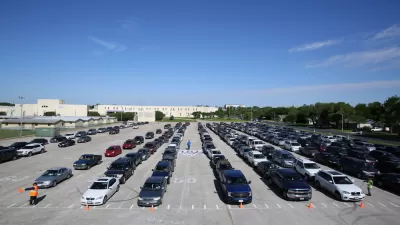The Week Without Driving challenge, scheduled Sept. 30 to Oct. 6 this year, encourages motorists, particularly policy makers and planning practitioners, to experience the challenges facing nondrivers in automobile-dependent communities.

Monday, September 30 – Sunday, October 6, 2024
If you can drive or afford a car, you may not understand what it’s like to rely on walking, rolling, transit and asking for rides. But for nearly a third of people living in the United States – people with disabilities, young people, seniors and people who can’t afford cars or gas – this is our every day.
We created the Week Without Driving challenge so that those who have the option to drive can learn firsthand about the barriers and challenges that nondrivers face and work with nondrivers to create more accessible communities for all.
How does the challenge work?

Every trip counts
You can get around however you want, but the challenge is not to drive yourself in any car. This applies to all your activities — not just your work commute. If you normally transport other family members or friends, it applies to those trips too.

Asking or paying for rides
You can ask someone else to drive you, but make a note of how much you “owe” this person in their time, and if you felt obligated to support them in other ways (ie, doing all the dishes). You can ride hail or taxis if they exist where you need to go, but again, think about how the cost could impact your decision to take this trip if this was regularly your only option.

Who has choices, what are your choices?
This isn’t a disability simulation or a test of how easily you can find alternatives. We know that it is far easier to give up your keys if you can afford to live in a walkable area well served by transit, or can outsource your driving and other transport and delivery needs to other people.

It’s okay to Drive – but reflect on what that means for nondrivers
Having to drive during the challenge does not signify failure. Sometimes the best reflection comes when someone participating in the challenge has to drive. The point is to consider how someone without that option would have coped, and what choices they might have made.
Impact
This week was a reminder that mobility is a human right. And it’s also a reminder that so many people in our region are excluded from this right, simply because driving for them is not an option.
— Girmay Zahilay, King County Councilmember, Washington State
How can I participate?
Anyone can participate in the Week Without Driving – whether you want to participate as an individual, organize your coworkers, or sign up as an elected leader or an advocacy organization.
If you’d like to find other organizations, look at our list of local and regional partners, and if you don’t see someone in your area, check out our templates and trainings to get started hosting the challenge.
FULL STORY: Week Without Driving

Maui's Vacation Rental Debate Turns Ugly
Verbal attacks, misinformation campaigns and fistfights plague a high-stakes debate to convert thousands of vacation rentals into long-term housing.

Planetizen Federal Action Tracker
A weekly monitor of how Trump’s orders and actions are impacting planners and planning in America.

In Urban Planning, AI Prompting Could be the New Design Thinking
Creativity has long been key to great urban design. What if we see AI as our new creative partner?

Portland Raises Parking Fees to Pay for Street Maintenance
The city is struggling to bridge a massive budget gap at the Bureau of Transportation, which largely depleted its reserves during the Civd-19 pandemic.

Spokane Mayor Introduces Housing Reforms Package
Mayor Lisa Brown’s proposals include deferring or waiving some development fees to encourage more affordable housing development.

Houston Mayor Kills Another Bike Lane
The mayor rejected a proposed bike lane in the Montrose district in keeping with his pledge to maintain car lanes.
Urban Design for Planners 1: Software Tools
This six-course series explores essential urban design concepts using open source software and equips planners with the tools they need to participate fully in the urban design process.
Planning for Universal Design
Learn the tools for implementing Universal Design in planning regulations.
Gallatin County Department of Planning & Community Development
Heyer Gruel & Associates PA
JM Goldson LLC
City of Camden Redevelopment Agency
City of Astoria
Transportation Research & Education Center (TREC) at Portland State University
Jefferson Parish Government
Camden Redevelopment Agency
City of Claremont





























